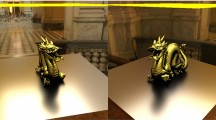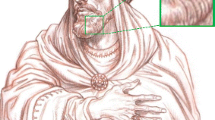Abstract
There are many objects whose shape requires them to be tessellated coarsely for example cone, cube, teapot with its body constituted by large triangles. The existing shading algorithms other than Phong Shading, cannot correctly render the specular highlights on such coarsely tessellated objects. It is known universally that Phong shading is still not used commercially due to its requirement of per-pixel normal vector normalization. In this paper, we present an algorithm that uses cubic bezier triangles for interpolation of diffuse and specular component of intensity. In most of such cases, this algorithm produces better visual results as compared to Phong Shading at comparatively lower cost.
Access this chapter
Tax calculation will be finalised at checkout
Purchases are for personal use only
Preview
Unable to display preview. Download preview PDF.
Similar content being viewed by others
REFERENCES
Gouraud H., “Continuous Shading of Curved Surfaces”, IEEE Transactions on Computers Vol 20, No. 6, 623–629, 1971
B.T. Phong, “Illumination for Computer Generated Pictures”, Communications of the ACM, Vol.18, No. 6, 1975
Russ Brown, “Modeling Specular Highlights Using Bezier Triangles”, Technical Report, Sun MicroSystems Laboratories, TR-99-75, 1999.
Ekta Walia, Chandan Singh, “Bi-Quadratic Interpolation of Intensity for Fast Shading of Three Dimensional Objects”, Image and Vision Computing, New Zealand Proceedings, pp 96–101, 2003.
Author information
Authors and Affiliations
Editor information
Editors and Affiliations
Rights and permissions
Copyright information
© 2006 Springer
About this chapter
Cite this chapter
Singh, C., Walia, E. (2006). AN ALGORITHM FOR IMPROVED SHADING OF COARSELY TESSELLATED POLYGONAL OBJECTS. In: Wojciechowski, K., Smolka, B., Palus, H., Kozera, R., Skarbek, W., Noakes, L. (eds) Computer Vision and Graphics. Computational Imaging and Vision, vol 32. Springer, Dordrecht. https://doi.org/10.1007/1-4020-4179-9_12
Download citation
DOI: https://doi.org/10.1007/1-4020-4179-9_12
Publisher Name: Springer, Dordrecht
Print ISBN: 978-1-4020-4178-5
Online ISBN: 978-1-4020-4179-2
eBook Packages: Computer ScienceComputer Science (R0)




